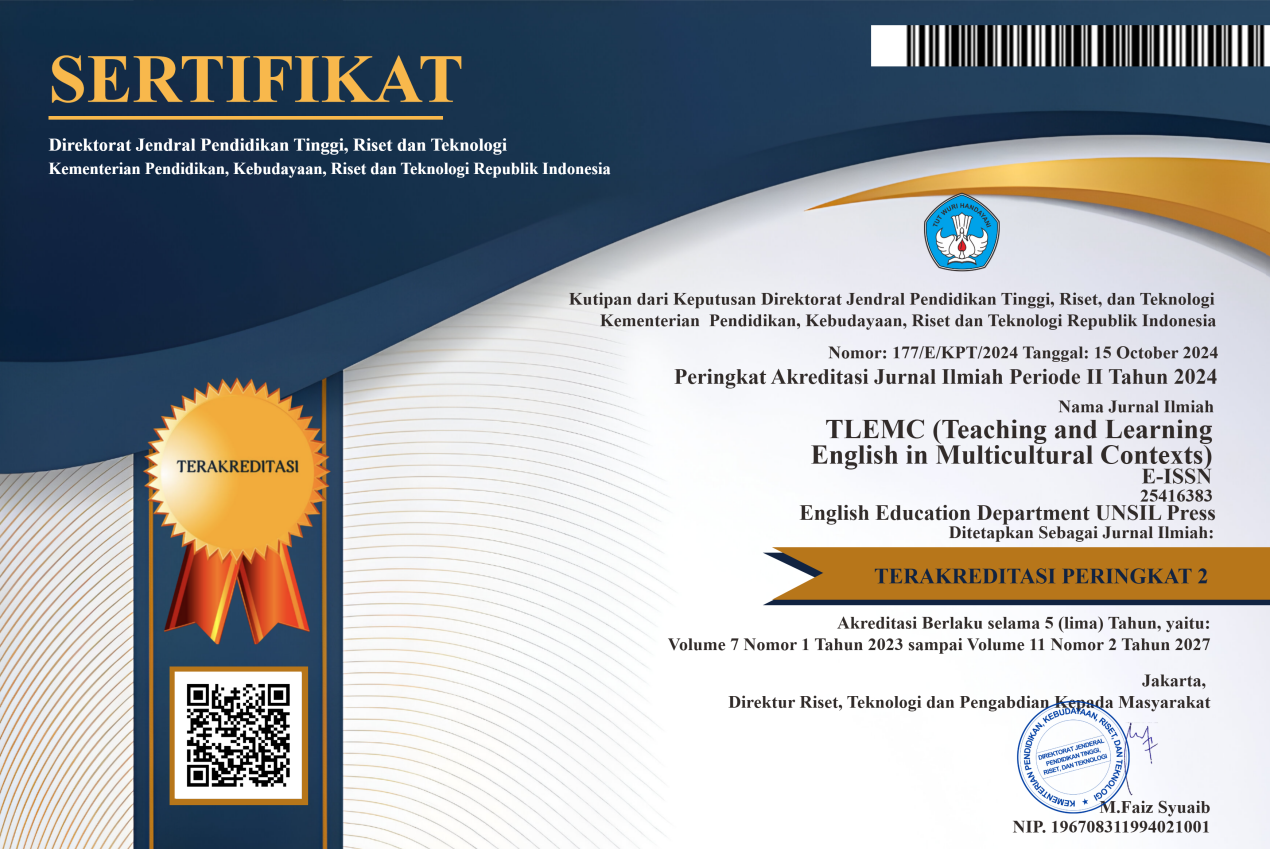Qualitative Research in the EFL Setting: Portraying Students' Problems and Actions
Abstract
This study examines the problems encountered by EFL students in composing qualitative research proposals and explores the tactics employed to address these problems. The study included three individuals who were enrolled as students in the English Education Department and had experienced delays in submitting their qualitative research proposals. The data were obtained via semi-structured interviews, wherein the researcher utilized mobile phones to record the participants' responses. The research employed a descriptive case study methodology and applied thematic analysis for data analysis. The findings of this study revealed a number of challenges encountered by students. These challenges encompassed deficiencies in various writing components, such as content-related problems, syntactic issues, vocabulary limitations, and challenges in sourcing references. Additionally, students faced internal obstacles, specifically a lack of motivation stemming from laziness. Lastly, technical difficulties were encountered when undertaking qualitative research proposals. In order to address these challenges, several potential solutions have been identified. One such solution involves fostering a supportive environment among peers, wherein they provide encouragement and assistance in the process of writing proposals. Additionally, it has been suggested that students may benefit from engaging in activities that restore their motivation and enthusiasm for research, such as watching educational content on platforms like YouTube. Lastly, self-evaluation has been proposed as a means of assessing their progress and identifying areas for improvement.
Keywords: Qualitative Research, EFL, Challenges and Solutions
Full Text:
PDFReferences
Amalia, H., Abdullah, F., & Fatimah, A. S. (2021). Teaching writing to junior high school students: A focus on challenges and solutions. Journal of Language and Linguistic Studies, 17(S2), 794-810.
Badiozaman, I. F. A. (2014). Paraphrasing challenges faced by Malaysian ESL students. Issues in Language Studies, 3(2). https://doi.org/10.33736/ils.1662.2014
Bakhshi, H., Weisi, H., & Yousofi, N. (2020). Challenges of Conducting Qualitative Research in the Iranian Higher Education: Voices from ELT Faculty Members. Iranian Journal of Comparative Education, 2019(2), 244–277. https://doi.org/10.22034/IJCE.2020.103674
Bogdan, B., & Bilken, S. K. (1992). Quality research for education: An introduction to theory and methods. Qualitative Research For Education An Introduction to Theory and Methods : : Allyn and Bacon., 106–156.
Braun, V., Clarke, V., Braun, V., & Clarke, V. (2017). Applied Qualitative Research in Psychology. Applied Qualitative Research in Psychology, 0887(2006). https://doi.org/10.1057/978-1-137-35913-1
Caluyua Yambi. (2020). Assessment and Evaluation in Education. Assessment and Evaluation, 4(July), 12–34.
Creswell, J. (2013). Chossing among five traditions. Qualitative Inquirí and Research Desing, 2005, 323–326.
Dautov, D. (2020). Procrastination and laziness rates among students with different academic performance as an organizational problem. E3S Web of Conferences, 210. https://doi.org/10.1051/e3sconf/202021018078
David, V. (2015). University of Huddersfield Repository University of Huddersfield Repository. Electronics and Computing in Textiles, 45–59.
Durga, S. S., & Rao, C. S. (2018). Developing students’ writing skills in English. Journal for Research Scholars and Proffessionals of English Language Teaching, 2(6), 1–69. https://www.researchgate.net/publication/325489625%0ADeveloping
Filgona, J., Sakiyo, J., Gwany, D. M., & Okoronka, A. U. (2020). Motivation in Learning. Asian Journal of Education and Social Studies, 10(4), 16–37. https://doi.org/10.9734/ajess/2020/v10i430273
Khankeh, H., Ranjbar, M., Khorasani-Zavareh, D., Zargham-Boroujeni, A., & Johansson, E. (2015). Challenges in conducting qualitative research in health: A conceptual paper. Iranian Journal of Nursing and Midwifery Research, 20(6), 635–641. https://doi.org/10.4103/1735-9066.170010
Klimova, B. F. (2014). Self-reflection in the Course Evaluation. Procedia - Social and Behavioral Sciences, 141, 119–123. https://doi.org/10.1016/j.sbspro.2014.05.022
Kristiana, E. (2020). Case Study: Learning Difficulties of Qualitative Research Methodology at Biology Education Postgraduate. IJECA (International Journal of Education and Curriculum Application), 3(1), 31. https://doi.org/10.31764/ijeca.v3i1.2039
Kue, J., Thorburn, S., & Keon, K. L. (2015). Research Challenges and Lessons Learned From Conducting Community-Based Research With the Hmong Community. Health Promotion Practice, 16(3), 411–418. https://doi.org/10.1177/1524839914561515
Li, S., & Seale, C. (2007). Learning to do qualitative data analysis: An observational study of doctoral work. Qualitative Health Research, 17(10), 1442–1452. https://doi.org/10.1177/1049732307306924
Mahyoob, M. (2020). Challenges of e-Learning during the COVID-19 Pandemic Experienced by EFL Learners. Arab World English Journal, 11(4), 351–362. https://doi.org/10.24093/awej/vol11no4.23
Mills, A., Durepos, G., & Wiebe, E. (2012). Encyclopedia of Case Study Research. In Encyclopedia of Case Study Research (Issue July 2016). https://doi.org/10.4135/9781412957397
Pardede, P. (2018). Identifying and Formulating the Research Problem. Reserarch in ELT, 1(October), 1–13. https://www.researchgate.net/publication/329179630_Identifying_and_Formulating_the_Research_Problem
Puspita, C. (2019). Factors affecting students’ difficuties in writing thesis A Mixed-Methods Research at Eighth Semester of English Study Program in IAIN Curup. 3rd English Language and Literature International Conference (ELLiC) Proceedings, 3, 13–22. https://jurnal.unimus.ac.id/index.php/ELLIC/article/view/4683/4210
Rahardjo, A., & Pertiwi, S. (2020). Learning Motivation and Students’ Achievement in Learning English: A Case Study at Secondary School Students in the Covid-19 Pandemic Situation Agus Rahardjo. JELITA: Journal of English Language Teaching and Literature, 1(2), 2721–1916.
Ritchie, J., Lewis, J., Nicholls, C. M. & Ormston, R. (Eds.). (2013). Qualitative research practice: A guide for social science students and researchers. London: Sage Publications.
Saripah, WA, Syukri, S. (2017). Improving students’ motivation through short story in learning English. Jurnal Al-Ta’dib, 10(2), 103–111.
Singh, Y. K., & Dubey, B. (2021). Introduction of Research Methods and Publication Ethics. India: Friends Publications.
Trishu, S., & Shruti, S. (2021). A study of YouTube as an effective educational tool. Journal of Contemporary Issues in Business and Government, 27(1), 2021. https://cibg.org.au/2686
Yin, R.K. 2018. Case study research and applications: Design and methods, 6th edn. Los Angeles: Sage Publications.
Yuri, N. P., & Yendi, F. M. (2020). The Relationship of Peer Social Support with Academic Self Efficacy. NeoKonseling, 2(3), 1–7. https://doi.org/10.24036/00294kons2020
Yusuf, Y. Q., Mustafa, F., & Iqbal, R. M. (2021). An inquiry into grammatical errors in writing committed by high achieving efl students. International Journal of Language Studies, 15(2), 1–22.
DOI: https://doi.org/10.37058/tlemc.v7i2.7799
Refbacks
- There are currently no refbacks.
INDEXED BY:
This work is licensed under a Creative Commons Attribution-NonCommercial-ShareAlike 4.0 International License.
![]()
TLEMC (Teaching and Learning English in Multicultural Contexts)
Program Studi Pendidikan Bahasa Inggris
Fakultas Keguruan dan Ilmu Pendidikan
Universitas Siliwangi
Jl. Siliwangi No. 24 Kota Tasikmalaya - 46115
email: tlemc@unsil.ac.id





